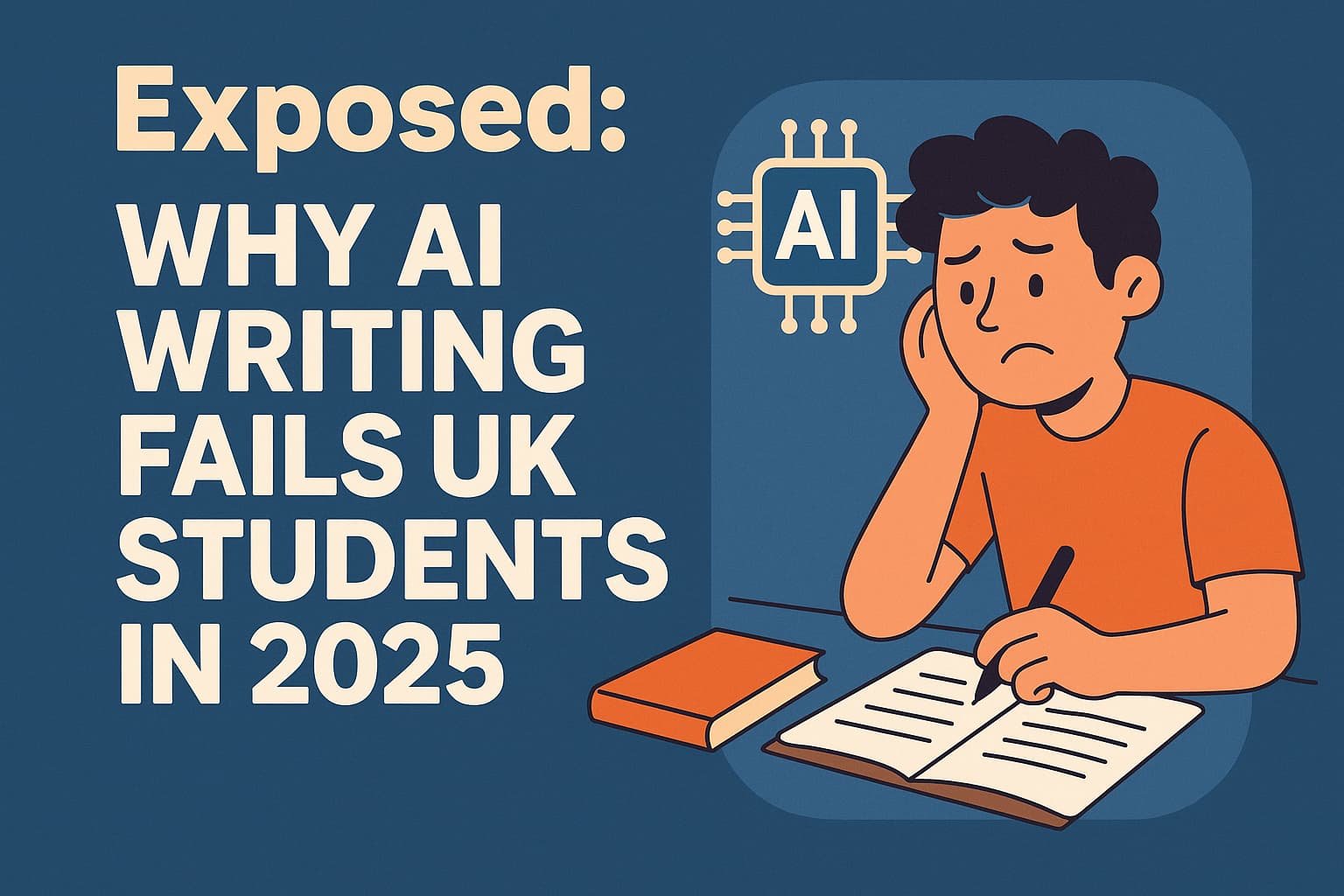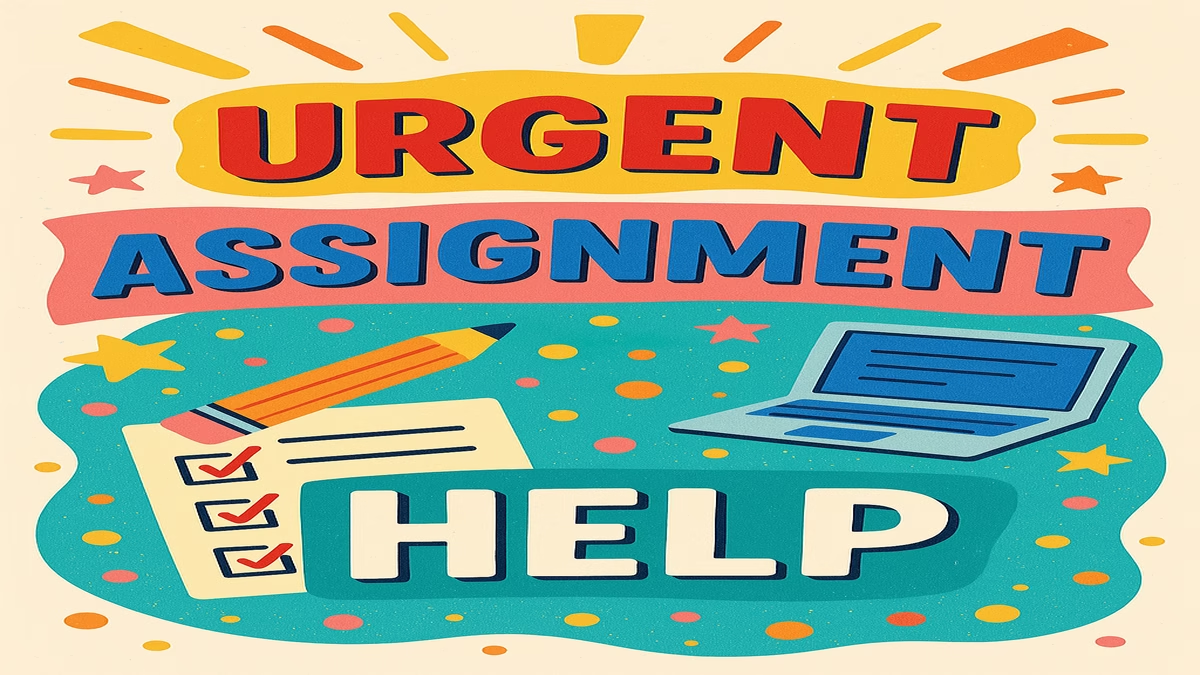Exposed: Why AI Writing Fails UK Students in 2025
Introduction
In 2025, UK students are facing a new academic dilemma: should they use AI tools like ChatGPT to write assignments, or stick with traditional human support services? While artificial intelligence has made huge strides in assisting academic work, universities across the UK are tightening their policies on AI-generated submissions. At the same time, human writers continue to play a vital role in delivering high-quality, original, and ethically sound academic content. This blog post explores the differences between AI and human writers, university guidelines, plagiarism risks, and how services like Urgent Assignment Help provide a safer, more effective alternative.
The Rise of AI Tools in Education
ChatGPT and Other AI Writing Assistants
The popularity of AI writing tools such as ChatGPT, Jasper, and Google Gemini has exploded among UK university students. These platforms offer instant responses, idea generation, and even full-length essay drafts in seconds. According to a 2025 report from the Higher Education Policy Institute (HEPI), over 90% of students have used AI tools at least once to assist with coursework. (source)
While these tools offer speed and convenience, they come with significant risks. AI-generated content can contain factual errors, hallucinations (fabricated data or citations), and structural flaws that are not aligned with academic standards.
AI Content Detection in 2025
How Universities Are Responding
UK universities are increasingly implementing AI-detection software such as GPTZero, Turnitin AI Detection, and Originality.ai to scan submitted assignments. Many institutions have updated academic integrity policies to clarify that submitting unedited AI-generated content is a form of misconduct.
“Submitting assignments created solely by AI tools, even with minor edits, may be classified as plagiarism or contract cheating,” says a policy update from the University of Leeds. (University of Leeds Policy)
Even when AI content isn’t flagged as plagiarised, it may still be penalised for lack of originality, weak argumentation, or failure to meet assessment criteria.
Comparing AI Writers vs Human Writers
Speed vs Quality
AI tools excel in speed and brainstorming, but they fall short on nuance, originality, and depth. Human writers, especially those with academic backgrounds, deliver:
- Accurate references and citation styles (Harvard, APA, MLA)
- Logical argument flow and coherence
- Critical thinking and analytical depth
- Awareness of university-specific requirements
At Urgent Assignment Help, our human experts include UK graduates and PhD-level writers who understand not only the subject matter but also the expectations of UK institutions.
Contextual Understanding
AI systems often misinterpret assignment prompts or produce generic responses. For example, a question asking for a “critical evaluation” might be answered with a basic summary if given to ChatGPT. Human writers, by contrast, understand tone, structure, and the purpose of the assignment.
Plagiarism and Originality
AI-generated content may not copy existing sources word-for-word, but it often lacks true originality. Furthermore, some models reuse phrasing from their training data, creating a grey area in terms of originality. Tools like Turnitin and Grammarly Premium can still flag these similarities, putting students at risk.
Human writers, however, generate work from scratch, perform real-time research, and apply personal insight—making plagiarism far less likely.
Legal and Ethical Concerns
University Policies in the UK
As of 2025, most UK universities, including Oxford, Manchester, and UCL, have issued detailed policies regarding AI use. These often state:
- AI tools may be used for idea generation or proofreading, but not for producing final submissions
- Students must declare AI use if allowed
- Breaching these rules can lead to formal academic misconduct investigations
Failure to follow these policies may result in penalties ranging from grade reduction to expulsion. Therefore, relying solely on AI tools poses serious academic risks.
Ethical Use of Assignment Help Services
Unlike AI tools, human-led services like Urgent Assignment Help operate within ethical boundaries. We provide customised assistance intended to guide students, not replace their learning. All documents are:
- Plagiarism-checked with Turnitin
- AI-reviewed to eliminate automation traces
- Confidential and GDPR-compliant
Real-World Examples
Case 1: AI Hallucination and Fabricated Citations
A third-year psychology student at a London university submitted an essay using ChatGPT. While the content was fluent, Turnitin detected over 40% AI probability, and several citations were fabricated. The student failed the assignment and was issued a formal warning.
Case 2: Human-Written Dissertation Support
A postgraduate business student used Urgent Assignment Help for editing and structure assistance on their dissertation. With original content and expert input, the student passed with distinction and faced no academic issues.
These examples demonstrate the clear risks of AI dependence and the advantages of using professional, human support.
SEO and AI Content Penalties
Google’s Stance on AI-Generated Pages
In addition to university guidelines, students running blogs or submitting content online should be aware of Google’s Helpful Content System. As of its 2024 update, Google now devalues:
- AI-heavy, low-quality pages
- Content that lacks first-hand experience
- Pages with repetitive or thin content
This affects not only grades but also public visibility of published academic work, such as research blogs or personal portfolios.
Google favors content that demonstrates E-E-A-T: Experience, Expertise, Authoritativeness, and Trustworthiness. Human-written content that reflects real knowledge scores better in both search and academic credibility. (Google Developer Guide)
When Should Students Use AI Tools?
Safe Use Cases
While AI is risky when misused, it has legitimate academic uses when used responsibly:
- Generating essay ideas or topic outlines
- Grammar checking or paraphrasing
- Learning definitions or summarising basic theories
Students should always review, rewrite, and cross-reference any AI-generated content. Better yet, use human support where accuracy and originality are crucial.
The Hybrid Future: Human + AI Collaboration
Combining Strengths
Rather than choosing AI vs human, the future may lie in combining both. Students might use AI for brainstorming, then rely on human editors for polishing, structure, and accuracy. Services like Urgent Assignment Help already incorporate this model:
- AI scans for tone and clarity
- Human experts rewrite, expand, and align to academic standards
This collaborative approach reduces risks while enhancing learning outcomes.
Final Thoughts: Make the Right Choice
In 2025, UK students must navigate a rapidly evolving academic world shaped by technology, regulation, and higher expectations. While AI tools offer speed and convenience, they are no match for human critical thinking, contextual awareness, and academic experience.
Universities are clear: using AI to write your assignments can cost you grades—or worse, your place at university. Human writers, like those at Urgent Assignment Help, provide ethical, original, and tailored support that aligns with university expectations.
Need last-minute support or expert feedback?
👉 Click here to chat on WhatsApp with our academic experts now.
Let your grades reflect your effort, not an AI bot. Make the smarter, safer choice today.


